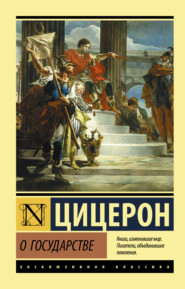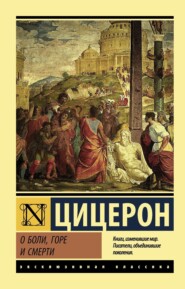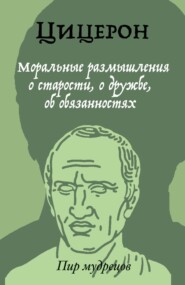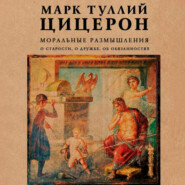По всем вопросам обращайтесь на: info@litportal.ru
(©) 2003-2024.
✖
Cicero's Tusculan Disputations
Автор
Год написания книги
2018
Настройки чтения
Размер шрифта
Высота строк
Поля
M. I am not at all surprised at that, for it is the effect of philosophy, which is the medicine of our souls; it banishes all groundless apprehensions, frees us from desires, and drives away fears: but it has not the same influence over all men; it is of very great influence when it falls in with a disposition well adapted to it. For not only does Fortune, as the old proverb says, assist the bold, but reason does so in a still greater degree; for it, by certain precepts, as it were, strengthens even courage itself. You were born naturally great and soaring, and with a contempt for all things which pertain to man alone; therefore a discourse against death took easy possession of a brave soul. But do you imagine that these same arguments have any force with those very persons who have invented, and canvassed, and published them, excepting indeed some very few particular persons? For how few philosophers will you meet with whose life and manners are conformable to the dictates of reason! who look on their profession, not as a means of displaying their learning, but as a rule for their own practice! who follow their own precepts, and comply with their own decrees! You may see some of such levity and such vanity, that it would have been better for them to have been ignorant; some covetous of money, some others eager for glory, many slaves to their lusts; so that their discourses and their actions are most strangely at variance; than which nothing in my opinion can be more unbecoming: for just as if one who professed to teach grammar should speak with impropriety, or a master of music sing out of tune, such conduct has the worst appearance in these men, because they blunder in the very particular with which they profess that they are well acquainted. So a philosopher who errs in the conduct of his life is the more infamous because he is erring in the very thing which he pretends to teach, and, while he lays down rules to regulate life by, is irregular in his own life.
V. A. Should this be the case, is it not to be feared that 69you are dressing up philosophy in false colors? For what stronger argument can there be that it is of little use than that some very profound philosophers live in a discreditable manner?
M. That, indeed, is no argument at all, for as all the fields which are cultivated are not fruitful (and this sentiment of Accius is false, and asserted without any foundation,
The ground you sow on is of small avail;
To yield a crop good seed can never fail),
it is not every mind which has been properly cultivated that produces fruit; and, to go on with the comparison, as a field, although it may be naturally fruitful, cannot produce a crop without dressing, so neither can the mind without education; such is the weakness of either without the other. Whereas philosophy is the culture of the mind: this it is which plucks up vices by the roots; prepares the mind for the receiving of seeds; commits them to it, or, as I may say, sows them, in the hope that, when come to maturity, they may produce a plentiful harvest. Let us proceed, then, as we began. Say, if you please, what shall be the subject of our disputation.
A. I look on pain to be the greatest of all evils.
M. What, even greater than infamy?
A. I dare not indeed assert that; and I blush to think I am so soon driven from my ground.
M. You would have had greater reason for blushing had you persevered in it; for what is so unbecoming—what can appear worse to you, than disgrace, wickedness, immorality? To avoid which, what pain is there which we ought not (I will not say to avoid shirking, but even) of our own accord to encounter, and undergo, and even to court?
A. I am entirely of that opinion; but, notwithstanding that pain is not the greatest evil, yet surely it is an evil.
M. Do you perceive, then, how much of the terror of pain you have given up on a small hint?
A. I see that plainly; but I should be glad to give up more of it.
M. I will endeavor to make you do so; but it is a great 70undertaking, and I must have a disposition on your part which is not inclined to offer any obstacles.
A. You shall have such: for as I behaved yesterday, so now I will follow reason wherever she leads.
VI. M. First, then, I will speak of the weakness of many philosophers, and those, too, of various sects; the head of whom, both in authority and antiquity, was Aristippus, the pupil of Socrates, who hesitated not to say that pain was the greatest of all evils. And after him Epicurus easily gave in to this effeminate and enervated doctrine. After him Hieronymus the Rhodian said, that to be without pain was the chief good, so great an evil did pain appear to him to be. The rest, with the exceptions of Zeno, Aristo, Pyrrho, were pretty much of the same opinion that you were of just now—that it was indeed an evil, but that there were many worse. When, then, nature herself, and a certain generous feeling of virtue, at once prevents you from persisting in the assertion that pain is the chief evil, and when you were driven from such an opinion when disgrace was contrasted with pain, shall philosophy, the preceptress of life, cling to this idea for so many ages? What duty of life, what praise, what reputation, would be of such consequence that a man should be desirous of gaining it at the expense of submitting to bodily pain, when he has persuaded himself that pain is the greatest evil? On the other side, what disgrace, what ignominy, would he not submit to that he might avoid pain, when persuaded that it was the greatest of evils? Besides, what person, if it be only true that pain is the greatest of evils, is not miserable, not only when he actually feels pain, but also whenever he is aware that it may befall him. And who is there whom pain may not befall? So that it is clear that there is absolutely no one who can possibly be happy. Metrodorus, indeed, thinks that man perfectly happy whose body is free from all disorders, and who has an assurance that it will always continue so; but who is there who can be assured of that?
VII. But Epicurus, indeed, says such things that it should seem that his design was only to make people laugh; for he affirms somewhere that if a wise man were to be burned or put to the torture—you expect, perhaps, 71that he is going to say he would bear it, he would support himself under it with resolution, he would not yield to it (and that by Hercules! would be very commendable, and worthy of that very Hercules whom I have just invoked): but even this will not satisfy Epicurus, that robust and hardy man! No; his wise man, even if he were in Phalaris’s bull, would say, How sweet it is! how little do I regard it! What, sweet? Is it not sufficient, if it is not disagreeable? But those very men who deny pain to be an evil are not in the habit of saying that it is agreeable to any one to be tormented; they rather say that it is cruel, or hard to bear, afflicting, unnatural, but still not an evil: while this man who says that it is the only evil, and the very worst of all evils, yet thinks that a wise man would pronounce it sweet. I do not require of you to speak of pain in the same words which Epicurus uses—a man, as you know, devoted to pleasure: he may make no difference, if he pleases, between Phalaris’s bull and his own bed; but I cannot allow the wise man to be so indifferent about pain. If he bears it with courage, it is sufficient: that he should rejoice in it, I do not expect; for pain is, beyond all question, sharp, bitter, against nature, hard to submit to and to bear. Observe Philoctetes: We may allow him to lament, for he saw Hercules himself groaning loudly through extremity of pain on Mount Œta. The arrows with which Hercules presented him were then no consolation to him, when
The viper’s bite, impregnating his veins
With poison, rack’d him with its bitter pains.
And therefore he cries out, desiring help, and wishing to die,
Oh that some friendly hand its aid would lend,
My body from this rock’s vast height to send
Into the briny deep! I’m all on fire,
And by this fatal wound must soon expire.
It is hard to say that the man who was obliged to cry out in this manner was not oppressed with evil, and great evil too.
VIII. But let us observe Hercules himself, who was subdued by pain at the very time when he was on the point 72of attaining immortality by death. What words does Sophocles here put in his mouth, in his Trachiniæ? who, when Deianira had put upon him a tunic dyed in the centaur’s blood, and it stuck to his entrails, says,
What tortures I endure no words can tell,
Far greater these, than those which erst befell
From the dire terror of thy consort, Jove—
E’en stern Eurystheus’ dire command above;
This of thy daughter, Œneus, is the fruit,
Beguiling me with her envenom’d suit,
Whose close embrace doth on my entrails prey,
Consuming life; my lungs forbid to play;
The blood forsakes my veins; my manly heart
Forgets to beat; enervated, each part
Neglects its office, while my fatal doom
Proceeds ignobly from the weaver’s loom.
The hand of foe ne’er hurt me, nor the fierce
Giant issuing from his parent earth.
Ne’er could the Centaur such a blow enforce,
No barbarous foe, nor all the Grecian force;
This arm no savage people could withstand,
Whose realms I traversed to reform the land.
Thus, though I ever bore a manly heart,
I fall a victim to a woman’s art.
IX.
Assist, my son, if thou that name dost hear,
My groans preferring to thy mother’s tear:
Convey her here, if, in thy pious heart,
Thy mother shares not an unequal part:
Proceed, be bold, thy father’s fate bemoan,
Nations will join, you will not weep alone.
Oh, what a sight is this same briny source,
Unknown before, through all my labors’ course!
That virtue, which could brave each toil but late,
With woman’s weakness now bewails its fate.
Approach, my son; behold thy father laid,
A wither’d carcass that implores thy aid;
Let all behold: and thou, imperious Jove,
On me direct thy lightning from above:
Now all its force the poison doth assume,
And my burnt entrails with its flame consume.
Crestfallen, unembraced, I now let fall
Listless, those hands that lately conquer’d all;
When the Nemæan lion own’d their force,
And he indignant fell a breathless corse;
The serpent slew, of the Lernean lake,
As did the Hydra of its force partake:
By this, too, fell the Erymanthian boar:
73E’en Cerberus did his weak strength deplore.
This sinewy arm did overcome with ease
That dragon, guardian of the Golden Fleece.
My many conquests let some others trace;
It’s mine to say, I never knew disgrace.[31 - Soph. Trach. 1047.]
Can we then, despise pain, when we see Hercules himself giving vent to his expressions of agony with such impatience?
V. A. Should this be the case, is it not to be feared that 69you are dressing up philosophy in false colors? For what stronger argument can there be that it is of little use than that some very profound philosophers live in a discreditable manner?
M. That, indeed, is no argument at all, for as all the fields which are cultivated are not fruitful (and this sentiment of Accius is false, and asserted without any foundation,
The ground you sow on is of small avail;
To yield a crop good seed can never fail),
it is not every mind which has been properly cultivated that produces fruit; and, to go on with the comparison, as a field, although it may be naturally fruitful, cannot produce a crop without dressing, so neither can the mind without education; such is the weakness of either without the other. Whereas philosophy is the culture of the mind: this it is which plucks up vices by the roots; prepares the mind for the receiving of seeds; commits them to it, or, as I may say, sows them, in the hope that, when come to maturity, they may produce a plentiful harvest. Let us proceed, then, as we began. Say, if you please, what shall be the subject of our disputation.
A. I look on pain to be the greatest of all evils.
M. What, even greater than infamy?
A. I dare not indeed assert that; and I blush to think I am so soon driven from my ground.
M. You would have had greater reason for blushing had you persevered in it; for what is so unbecoming—what can appear worse to you, than disgrace, wickedness, immorality? To avoid which, what pain is there which we ought not (I will not say to avoid shirking, but even) of our own accord to encounter, and undergo, and even to court?
A. I am entirely of that opinion; but, notwithstanding that pain is not the greatest evil, yet surely it is an evil.
M. Do you perceive, then, how much of the terror of pain you have given up on a small hint?
A. I see that plainly; but I should be glad to give up more of it.
M. I will endeavor to make you do so; but it is a great 70undertaking, and I must have a disposition on your part which is not inclined to offer any obstacles.
A. You shall have such: for as I behaved yesterday, so now I will follow reason wherever she leads.
VI. M. First, then, I will speak of the weakness of many philosophers, and those, too, of various sects; the head of whom, both in authority and antiquity, was Aristippus, the pupil of Socrates, who hesitated not to say that pain was the greatest of all evils. And after him Epicurus easily gave in to this effeminate and enervated doctrine. After him Hieronymus the Rhodian said, that to be without pain was the chief good, so great an evil did pain appear to him to be. The rest, with the exceptions of Zeno, Aristo, Pyrrho, were pretty much of the same opinion that you were of just now—that it was indeed an evil, but that there were many worse. When, then, nature herself, and a certain generous feeling of virtue, at once prevents you from persisting in the assertion that pain is the chief evil, and when you were driven from such an opinion when disgrace was contrasted with pain, shall philosophy, the preceptress of life, cling to this idea for so many ages? What duty of life, what praise, what reputation, would be of such consequence that a man should be desirous of gaining it at the expense of submitting to bodily pain, when he has persuaded himself that pain is the greatest evil? On the other side, what disgrace, what ignominy, would he not submit to that he might avoid pain, when persuaded that it was the greatest of evils? Besides, what person, if it be only true that pain is the greatest of evils, is not miserable, not only when he actually feels pain, but also whenever he is aware that it may befall him. And who is there whom pain may not befall? So that it is clear that there is absolutely no one who can possibly be happy. Metrodorus, indeed, thinks that man perfectly happy whose body is free from all disorders, and who has an assurance that it will always continue so; but who is there who can be assured of that?
VII. But Epicurus, indeed, says such things that it should seem that his design was only to make people laugh; for he affirms somewhere that if a wise man were to be burned or put to the torture—you expect, perhaps, 71that he is going to say he would bear it, he would support himself under it with resolution, he would not yield to it (and that by Hercules! would be very commendable, and worthy of that very Hercules whom I have just invoked): but even this will not satisfy Epicurus, that robust and hardy man! No; his wise man, even if he were in Phalaris’s bull, would say, How sweet it is! how little do I regard it! What, sweet? Is it not sufficient, if it is not disagreeable? But those very men who deny pain to be an evil are not in the habit of saying that it is agreeable to any one to be tormented; they rather say that it is cruel, or hard to bear, afflicting, unnatural, but still not an evil: while this man who says that it is the only evil, and the very worst of all evils, yet thinks that a wise man would pronounce it sweet. I do not require of you to speak of pain in the same words which Epicurus uses—a man, as you know, devoted to pleasure: he may make no difference, if he pleases, between Phalaris’s bull and his own bed; but I cannot allow the wise man to be so indifferent about pain. If he bears it with courage, it is sufficient: that he should rejoice in it, I do not expect; for pain is, beyond all question, sharp, bitter, against nature, hard to submit to and to bear. Observe Philoctetes: We may allow him to lament, for he saw Hercules himself groaning loudly through extremity of pain on Mount Œta. The arrows with which Hercules presented him were then no consolation to him, when
The viper’s bite, impregnating his veins
With poison, rack’d him with its bitter pains.
And therefore he cries out, desiring help, and wishing to die,
Oh that some friendly hand its aid would lend,
My body from this rock’s vast height to send
Into the briny deep! I’m all on fire,
And by this fatal wound must soon expire.
It is hard to say that the man who was obliged to cry out in this manner was not oppressed with evil, and great evil too.
VIII. But let us observe Hercules himself, who was subdued by pain at the very time when he was on the point 72of attaining immortality by death. What words does Sophocles here put in his mouth, in his Trachiniæ? who, when Deianira had put upon him a tunic dyed in the centaur’s blood, and it stuck to his entrails, says,
What tortures I endure no words can tell,
Far greater these, than those which erst befell
From the dire terror of thy consort, Jove—
E’en stern Eurystheus’ dire command above;
This of thy daughter, Œneus, is the fruit,
Beguiling me with her envenom’d suit,
Whose close embrace doth on my entrails prey,
Consuming life; my lungs forbid to play;
The blood forsakes my veins; my manly heart
Forgets to beat; enervated, each part
Neglects its office, while my fatal doom
Proceeds ignobly from the weaver’s loom.
The hand of foe ne’er hurt me, nor the fierce
Giant issuing from his parent earth.
Ne’er could the Centaur such a blow enforce,
No barbarous foe, nor all the Grecian force;
This arm no savage people could withstand,
Whose realms I traversed to reform the land.
Thus, though I ever bore a manly heart,
I fall a victim to a woman’s art.
IX.
Assist, my son, if thou that name dost hear,
My groans preferring to thy mother’s tear:
Convey her here, if, in thy pious heart,
Thy mother shares not an unequal part:
Proceed, be bold, thy father’s fate bemoan,
Nations will join, you will not weep alone.
Oh, what a sight is this same briny source,
Unknown before, through all my labors’ course!
That virtue, which could brave each toil but late,
With woman’s weakness now bewails its fate.
Approach, my son; behold thy father laid,
A wither’d carcass that implores thy aid;
Let all behold: and thou, imperious Jove,
On me direct thy lightning from above:
Now all its force the poison doth assume,
And my burnt entrails with its flame consume.
Crestfallen, unembraced, I now let fall
Listless, those hands that lately conquer’d all;
When the Nemæan lion own’d their force,
And he indignant fell a breathless corse;
The serpent slew, of the Lernean lake,
As did the Hydra of its force partake:
By this, too, fell the Erymanthian boar:
73E’en Cerberus did his weak strength deplore.
This sinewy arm did overcome with ease
That dragon, guardian of the Golden Fleece.
My many conquests let some others trace;
It’s mine to say, I never knew disgrace.[31 - Soph. Trach. 1047.]
Can we then, despise pain, when we see Hercules himself giving vent to his expressions of agony with such impatience?














